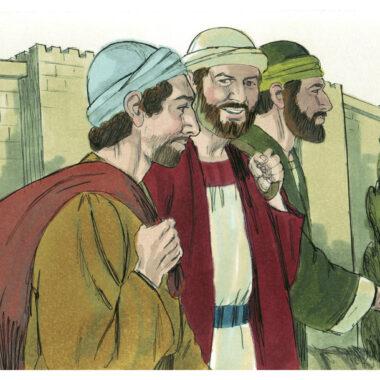25 And Barnabas and Saul returned from Jerusalem when they had fulfilled their ministry, and they also took with them John whose surname was Mark.
 Barnabas and Saul have been away from the church in Antioch on a mission to Judea. These two men of God were sent out of the predominantly Gentile church in Antioch with aid for the predominantly Jewish church in Jerusalem. The famine relief mentioned Acts 11:30 has now been delivered. Take a moment with me to review the mission of Barnabas and Saul. It is recorded in Acts 11:27-30.
Barnabas and Saul have been away from the church in Antioch on a mission to Judea. These two men of God were sent out of the predominantly Gentile church in Antioch with aid for the predominantly Jewish church in Jerusalem. The famine relief mentioned Acts 11:30 has now been delivered. Take a moment with me to review the mission of Barnabas and Saul. It is recorded in Acts 11:27-30.
27 And in these days prophets came from Jerusalem to Antioch. 28 Then one of them, named Agabus, stood up and showed by the Spirit that there was going to be a great famine throughout all the world, which also happened in the days of Claudius Caesar. 29 Then the disciples, each according to his ability, determined to send relief to the brethren dwelling in Judea. 30 This they also did, and sent it to the elders by the hands of Barnabas and Saul. (Acts 11:27–30, NKJV)
Barnabas and Saul returned from a fulfilled ministry. In their service to the saints of Judea they brought three things: (1) relevant aid to an ailing region, (2) practical proof of God’s life-changing work in the Gentiles of Antioch, and (3) the Master’s plan for making a difference – discipleship. Where, you might ask, is the text talking about Barnabas and Saul bringing the Master’s plan? It is so subtle you might not see it. It is so plain in the presentation of early church history that it has to be pointed out – and they also took with them John whose surname was Mark. In that brief description of their company is a communication about how they made the most of that missional moment. They used it to mentor John Mark. This is the way of our Master.
Having called his men, Jesus made a practice of being with them. This was the essence of his training program—just letting his disciples follow him.
When one stops to think of it, this was an incredibly simple way of doing it. Jesus had no formal school, no seminaries, no outlined course of study, no periodic membership classes in which he enrolled his followers. None of these highly organized procedures considered so necessary today entered into his ministry. Amazing as it may seem, all Jesus did to teach these men his way was to draw them close to himself. He was his own school and curriculum.
Coleman, Robert E. (2006). The Master Plan of Evangelism (p. 33). Grand Rapids, MI: Revell.
It is important that we stay on the lookout for people to mentor while we are engaged in the ongoing mission of reaching the community with the gospel. How do we include them? The answer is as simple as the Lord’s approach to evangelism – keep them with you as you do what you do.
- Keep them with you when you visit with the sick and shut-in.
- Keep them with you when you are planning worship.
- Keep them with you when you are working on financial matters for the church.
- Keep them with you when you are working on the sermon for Sunday.
- Keep them with you when you are going into the community with the gospel.
- Keep them with you when you go to lunch.
- Keep them with you when you prepare a meal for your family.
- Keep them with you when you work on your yard.
- Keep them with you when you do maintenance on the building.
- Keep them with you when you take time to pray for the fellowship.
To be sure, that will mean a ministry that, comparatively speaking, moves a little slower and looks a little lackluster. And working with the people that you are mentoring will initially make your work take longer. But in due time they will help to multiply effect of efforts to make Christ known. We are often so focused on doing things faster and cheaper that we lose sight of the main thing – making disciples (Matthew 28:18-20). When we go it alone we become more efficient but less effective. To really make a difference according to the manner of the Master and his men don’t miss your Mark.
